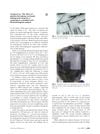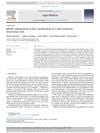 2 citations,
January 2020 in “International Journal of Medical Sciences”
2 citations,
January 2020 in “International Journal of Medical Sciences” Avoid alcohol, ponytails, and oily scalp, and get good sleep to prevent severe hair loss.
 1 citations,
August 2023 in “Acta dermato-venereologica”
1 citations,
August 2023 in “Acta dermato-venereologica” Corticosteroids are the most common treatment for alopecia areata, but many patients need better options.
 December 2023 in “Frontiers in oncology”
December 2023 in “Frontiers in oncology” Older ovarian cancer patients live longer and tolerate weekly chemotherapy better than three-weekly treatments.
 February 2021 in “Journal of The American Academy of Dermatology”
February 2021 in “Journal of The American Academy of Dermatology” Platelet-rich plasma therapy's effectiveness for female hair loss needs more accurate data and further examination.
 12 citations,
December 2013 in “The Journal of Urology”
12 citations,
December 2013 in “The Journal of Urology” Men's age, urinary symptoms, and heart health risks create different types of erectile dysfunction.
 7 citations,
July 2019 in “Scientific Reports”
7 citations,
July 2019 in “Scientific Reports” Finasteride helps reduce heart enlargement in heart failure patients.
 5 citations,
October 2018 in “Research in psychotherapy”
5 citations,
October 2018 in “Research in psychotherapy” The Italian version of a relationship scale was adapted for cancer patients, showing some differences from the original and suggesting its use could improve therapy and treatment adherence.
 February 2025 in “Clinical Cosmetic and Investigational Dermatology”
February 2025 in “Clinical Cosmetic and Investigational Dermatology” Higher fasting insulin levels increase the risk of androgenetic alopecia.
 March 2024 in “Clinical and experimental dermatology”
March 2024 in “Clinical and experimental dermatology” Topical corticosteroids may be a safe and effective treatment for severe alopecia areata in children.
2 citations,
January 2022 in “Skin appendage disorders” Low-dose oral minoxidil effectively promotes hair growth but has associated risks.
October 2022 in “Faculty Opinions – Post-Publication Peer Review of the Biomedical Literature”  11 citations,
April 2019 in “Journal of Biological Research”
11 citations,
April 2019 in “Journal of Biological Research” The study identified 12 potential biomarkers for hair loss and how they affect hair growth.
 2 citations,
March 2023 in “Annals of Translational Medicine”
2 citations,
March 2023 in “Annals of Translational Medicine” The analysis shows the U.S. leads in tissue expansion research, mainly for breast reconstruction, with a slightly higher complication rate when using acellular dermal matrix.
12 citations,
January 2018 in “Journal of Clinical Laboratory Analysis” Certain IL-18 gene variations may increase the risk of alopecia areata.
 7 citations,
February 2021 in “Legal Medicine”
7 citations,
February 2021 in “Legal Medicine” Hair analysis showed very high metformin levels in two fatal overdose cases, suggesting it's useful in forensics but sweat may affect results.
 3 citations,
February 2022 in “Frontiers in Genetics”
3 citations,
February 2022 in “Frontiers in Genetics” The LncRNA AC010789.1 slows down hair loss by promoting hair follicle growth and interacting with miR-21 and the Wnt/β-catenin pathway.
 January 2025 in “Scientific Reports”
January 2025 in “Scientific Reports” Hair analysis can show changes in vitamin D levels over time.
 December 2024 in “Kırıkkale Üniversitesi Tıp Fakültesi Dergisi”
December 2024 in “Kırıkkale Üniversitesi Tıp Fakültesi Dergisi” Chromosomal microarray analysis is important for diagnosing rare genetic variations and guiding treatment.
 October 2024 in “Archives of Dermatological Research”
October 2024 in “Archives of Dermatological Research” Male and female pattern hair loss have different molecular pathways, suggesting unique treatment targets for each sex.
 October 2024 in “Skin Appendage Disorders”
October 2024 in “Skin Appendage Disorders” PRP is popular for hair restoration but needs better research methods to confirm its effectiveness and safety.
November 2022 in “Annals of Translational Medicine” Immune activities and specific genes are important in male pattern baldness.
16 citations,
December 2020 in “PloS one” Researchers found WNT10A to be a key gene in developing goat hair follicles.
 2 citations,
January 2023 in “Pharmaceuticals”
2 citations,
January 2023 in “Pharmaceuticals” Sex and sex hormones can affect brain inflammation in Parkinson's disease, with male mice being more affected and female mice showing a protective effect.
1 citations,
March 2020 in “Meždunarodnyj medicinskij žurnal” PRP could be a promising treatment for hair loss but needs more research.
 June 2024 in “Journal of cosmetic dermatology”
June 2024 in “Journal of cosmetic dermatology” Dutasteride is the most studied alternative drug for androgenetic alopecia, but more high-quality research is needed.
 March 2024 in “Journal of Endocrinological Investigation”
March 2024 in “Journal of Endocrinological Investigation” Finasteride treatment in rats changed the expression of genes related to psychiatric and neurological functions, and these changes persisted after stopping the drug.
 February 2024 in “BMJ Open”
February 2024 in “BMJ Open” The study concluded that different treatments reduced post-COVID symptoms over time and that factors like age, severity, and comorbidities affect symptom risk.
 November 2023 in “Indian Dermatology Online Journal”
November 2023 in “Indian Dermatology Online Journal” Tofacitinib was effective for severe, treatment-resistant hair loss without side effects.
November 2023 in “Children” Many pediatric epilepsy patients experience preventable severe adverse drug reactions, especially with certain medications and risk factors.
 September 2023 in “Nature Communications”
September 2023 in “Nature Communications” Rare genetic variants in five specific genes are linked to male-pattern hair loss but only account for a small part of the risk.























